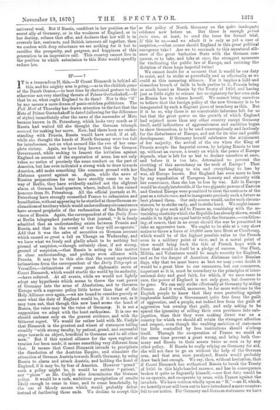TOPICS OF THE DAY.
THE RUSSIAN NOTE.
WE do not wonder that the Russian Note has startled all the neutral Cabinets of Europe, has carried dismay on to all Bourses, has roused German publicists to protest, and has excited new hope in Tours,—for a more daring and open defiance of European law, of international morality, and of British policy was never uttered to the world. It signifies that Russia sees a chance of conquering Constantinople, and in- tends to conquer it, 'whether Great Britain likes or tolerates her action or not. The Crimean war, apparently so devoid of direct results proportionate to the blood and treasure expended, gave England at least this one intelligible compensation, that, while the Treaty of Paris endured, Constantinople could not be taken by a sudden surprise. For Russia to march an army to Con- stantinople by land is a most formidable enterprise, one demand- ing long preparation, immense resources, and at least two very hazardous campaigns. The way is long-600 miles—the Turks are brave, the Russians die like sheep in the wet, and the in- vaders are exposed at any moment to the danger of being taken in the flank or rear by the Austrian Army. It was, however, possible to assail Constantinople by sea. The Turkish fleet never was and never will be in really good fighting order ; the Turkish departments never were and never will be beyond the reach of bribes ; and the Turkish sailors, brave as they are and devoted as they are, have never beaten Russians. Secure in her isolation, her despotic system, and her splendid rivers, Russia could silently create in the Black Sea a fleet and a flotilla which could in a week lay Constantinople at her mercy, and enable the Czar, as Sultan also, to call all the Christians of Turkey to arms behind his troops. If Constantinople were worth preserving—a point upon which as yet we give no opinion—this was the point of serious danger, and it was to this point that the Treaty of 1856 was specially directed. By Articles 11, 12, and 13 of that Treaty, it is arranged that "The Black Sea is neutralized ; its waters and its ports, thrown open to the mercantile marine of every nation, are formally and in perpetuity interdicted to the flag of war, either of the Powers possessing its coasts, or of any other Power, with the exceptions mentioned in Articles 14 and 19 of the present Treaty. Free from any impediment, the corn- merce in the ports and waters of the Black Sea shall be sub- ject only to regulations of health, customs, and police, framed in a spirit favourable to the development of commercial trans- actions. The Black Sea being neutralized according to the terms of Art. 11, the maintenance or establishment upon its coasts of military-maritime arsenals becomes alike un- necessary and purposeless ; in consequence, the Emperor of Russia and the Sultan engage not to establish or to maintain upon that coast any military-maritime arsenal." The English nation, though furious at the premature conclu- sion of peace, regarded these clauses as their one compensation for their sufferings, and accepted the Treaty as a settlement for a generation at least of the great "Eastern Question." Russia had bound herself not to take Constantinople without European consent—that was what the Treaty really meant in English eyes, and if Russia held the arrangement to be merely a postponement of her designs, still the Imperial Court, a Conservative and respectable Court, would, as long as it could control events, be bound by its engagements. More especially was it certain that Czar Alexander would be bound by them. He himself made the Treaty, he was so absolute as to be personally responsible, and he was a man of high character and philanthropic tendencies, neither likely to break his word nor to plunge Europe once more into war.
So long as France remained a power, this Treaty remained intact. Prince Gortschakoff indeed complains that certain undescribed war-ships have appeared in the Black Sea, and correspondents talk vaguely about sixty ironclad gunboats an Russian rivers ; but neither Russia nor Turkey have ever complained of any infraction of the agreement, and England has been so satisfied that she has almost forgotten the whole affair. From the very beginning of this war, however, sinister rumours have been afloat of the ultimate intentions of St. Petersburg. The sort of anxious fidelity with which the Czar and his Court, in spite of the opposition of his people, adhered to the German side, of itself excited a suspicion which at one moment became very active in Vienna, but. suddenly cooled down. France of course was a friend of the Poles, who once elected Napoleon their King ; but with her best provinces full of Germans, and the students of Dorpat singing the " Wacht am Rhein," it seemed incredible that Russia should desire the complete prostration of France, or be sincere in heaping honours. upon the Hohenzollerns. If she were sincere, a price muss have been arranged, and the price, it was openly said, was. immunity for her designs in the East, and perhaps- assistance in their fulfilment. With France prostrate and England intent upon economy, Russia would have only Austria. to dread, and Austria might be paralyzed wholly or in part by a menace from reunited Germany. There was much specula, tion of this kind, all of it more or less dreamy ; bat no one,. least of all the British Government, suspected that the alarmists. had discerned the Russian design, that the Treaty of 1856; would be attacked during the Franco-German struggle, or that a Russian Czar would announce frankly and defiantly that treaties—to bind Russia—must be convenient. Yet this is what Prince Gortschakoff, with smooth and polished audacity, has, on the 19th inst., announced to Europe. Hardly troubling himself to invent a reason—for his statement that the Princi- palities have been united since 1856 is a mere pretext, Prince- Charles having been recognized by Russia—the Prince writes. to all the agents of his Government :—" The Emperor bids you; declare that His Imperial Majesty can no longer consider
self as bound to the terms of the Treaty of March 18, 1856) in so far as these limit his rights of sovereignty in the Black Sea. That His Imperial Majesty considers it his right and his duty to give notice to His Majesty the Sultan of his with- drawal from the special and additional Convention annexed to that Treaty which fixes the number and the size of the. men-of-war which the two Powers bordering on . the- Black Sea reserve to keep in the said sea. That in this- respect he replaces the Sultan in full possession of alb his rights in the same manner as he reclaims his own.". In plain English, the Russian Government, finding the Treaty of Paris inconvenient to its designs and injurious to its; dignity, declares that the Treaty ceases to exist. It does not,. as regards the Black Sea, ask for its revision, though ib suggests such revision of the remaining clauses,—that would, have been an unobjectionable proceeding ; it does not demand its revision,—that, though unusual, would have been a perfectly fair proceeding ; it does not even threaten war as inevitable- unless the revision is conceded,—that, though a haughty, would have been a legal proceeding. It simply announces in the- clearest words a diplomatist could use that the Treaty has. ceased to exist, that Russia is bound by no pledge however solemn, and will hold herself in readiness, treaties notwith- standing, to attack Turkey whenever she feels disposed. We- accept the interpretation with the utmost reluctance, for we would most gladly avoid the inevitable conclusion ; but there- is no room for doubt, no loophole for explanation, no mode- that we can perceive by which Russia can retreat from her position. The Treaty of Paris, so far as English or Turkish interests are concerned, has ceased to exist. The time selected, a few days before the closing of the Baltic, the wording of the Circular, the limitation of the menace to the single clause which does not immediately affect Germany, everything points to an unalterable and a warlike resolution.
We can see but one course which it is possible for Great Britain to pursue, namely, to accept what is virtually a chal- lenge, and sink the first Russian war steamer which appears in defiance of the Treaty on the waters of the Black Sea. It may be quite true—we are strongly inclined to believe it is. true--that in the changed circumstances of the world a war for Constantinople is an anachronism ; that it would be far wiser to wait until the German race needs an ally in its. inevitable quarrel with the Slavon ; far wiser to let the great Eastern Power spend its resources in the necessary but most distasteful work of terminating Turkish misrule ; far pleasanter to avoid a quarrel which, with Germany uncertain or hostile and America unfriendly, may be the beginning of a grand cycle of misfortunes for Great Britain. It would be far cheaper to buy from the Sultan the only right which forces us to his side—the suzerainte of Egypt—govern the Isthmus as we govern Hydrabad, and fight for it, if necessary, as we should fight for Cornwall. A dozen policies would be preferable to the one harsh, burdensome, dangerous line of duty ; but as we apprehend the facts, that duty is clear. If Russia likes to submit her claims to a European Congress, well and good. Her fellow contractors can, of course, release her from her contract ; nor are we inclined to deny to such a Con- gress, when fairly organized, some legislative as well as con- tracting power, some right of declaring, as municipal Parlia- ments declare, that such and such old laws are inconsistent with the times, such and such old contracts contrary to the
universal weal. But if Russia, confident in her position as the secret ally of Germany, or in the weakness of England, or in her destiny, refuses that offer, and declares that her will is to overrule law, contracts, and British interests all together, then we confess with deep reluctance we see nothing for it but to sacrifice the prosperity, and progress, and happiness of this generation to an imperative call. This country cannot live in the position to which submission to this Note would speedily reduce her.



































 Previous page
Previous page